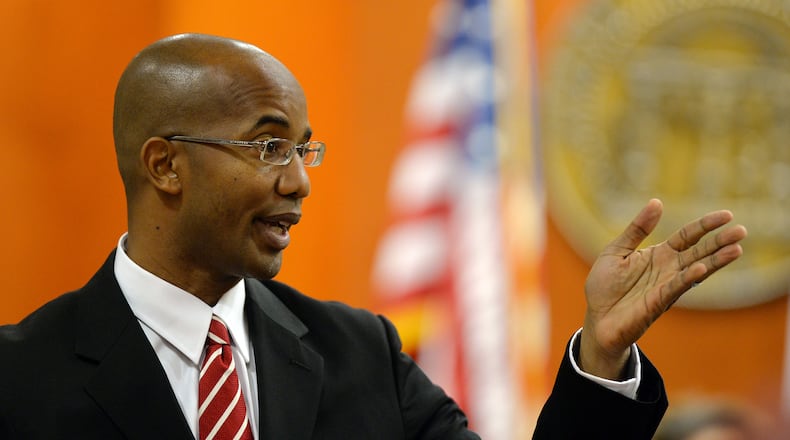It started with a grease inspector taking bribes for restaurant permits.
After the inspector, Dameco Moss, pleaded guilty in May 2011, a sprawling investigation eventually led to the top of DeKalb County’s government, resulting in criminal charges against suspended county CEO Burrell Ellis.
Ellis goes on trial Monday, the culmination of years of inquiries surrounding sewage spills, expensive cleanup efforts, contract fraud, alleged cover-ups and cutthroat politics. Ellis has denied charges that he extorted campaign contributions from county vendors.
Moss, who served three months in jail, was just the beginning.
“None of us imagined it would go out to the highest level of government,” said Albert Trujillo, the retiree who was the foreman of a citizen special grand jury that conducted a yearlong investigation. “It branched out and branched out, involving people of higher responsibility. It began to really open our eyes.”
After Moss pleaded guilty, a deputy director in the county’s water and sewer department, Jo Ann Macrina, approached DeKalb prosecutors with information about corruption reaching far beyond Moss and grease disposal, according to a special grand jury report. Macrina told them about a police investigation of invoice padding, contract fraud and bid rigging.
A detective on the case had created a chart linking various county vendors to high-ranking government officials. Soon after turning over the chart to a deputy police chief in February 2010, then-DeKalb Public Safety Director William “Wiz” Miller instructed investigators to stop their inquiry, the report said. He didn’t provide an explanation.
Suspicions of corruption led DeKalb District Attorney Robert James to seek an investigation through the special grand jury process, in which 23 DeKalb residents spent a year during 2012 listening to 89 witnesses and reviewing piles of documents.
The special grand jury’s inquiry initially focused on allegations of fraud and cronyism as the county was beginning a vast $1.7 billion upgrade of sewer lines. The county in December 2010 consented to the costly improvements sought by the U.S. Environmental Protection Agency after reporting more than 800 raw sewage spills in five years.
The scope and number of allegations grew as the special grand jury followed the evidence trail.
“It was like popcorn. Pop, pop, pop, pop, pop, pop,” said John Melvin, the DeKalb prosecutor who led the district’s public integrity unit at the time, according to a transcript of a January court hearing.
The special grand jury’s attention soon turned to Ellis.
It reviewed a memo titled “Things to Know,” written by Jeffrey Walker, a politically connected business consultant. Walker’s memo said Ellis “sweats out” contractors by withholding his signature from contracts unless they gave him the maximum $2,500 contribution to his election campaign.
In one case, the special grand jury’s report said, a Tucker company called Desmear Systems gave Ellis $2,500 in February 2012. The next day, county employees gave Desmear the go-ahead to proceed with a contract for sidewalk repair and landscaping.
Three months later, Desmear won a $7.7 million contract for excavation at a wastewater treatment facility. The county removed Desmear from the project in September 2013, citing shoddy work after an Atlanta Journal-Constitution investigation turned up problems at the facility.
The special grand jury also heard testimony from employees at several companies who said Ellis pressured and threatened them for campaign donations. Some of those companies — Power and Energy Services, National Property Institute and Merrell Brothers — were later named in the June 2013 indictment against Ellis, and their executives may be called as witnesses during his trial.
The 81-page report from the special grand jury, completed in January 2013, formed the basis for many of the criminal charges Ellis now faces. The special grand jury also recommended further criminal investigation of 11 others, but no one else has been charged. A spokesman for James has said he’s aware of the report.
“We were totally surprised by the testimony and by what was going on,” Trujillo said. “I would go home after a day in the grand jury and be sick to my stomach and depressed.”
About the Author
Keep Reading
The Latest
Featured




